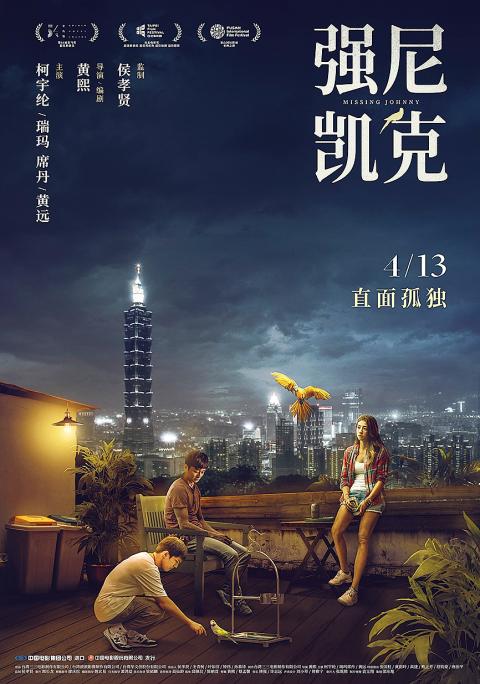The screening of the Taiwanese film Missing Johnny (強尼‧凱克), produced by director Hou Hsiao-hsien (侯孝賢), has been indefinitely suspended in China after furor broke out on Chinese social media over claims that its male lead, Lawrence Ko (柯宇綸), supports Taiwanese independence.
The Chinese distributor of the film, China Film Co (中國電影), on Monday said in a statement that the film, originally scheduled for release on April 14, has been put on hold until further notice.
China Films did not give a reason for the delay, but the announcement closely followed public outcry over an online article accusing Ko of supporting Taiwanese independence.

Photo: Pan Shao-tang, Taipei Times
“Pro-Taiwanese independence entertainer Lawrence Ko’s movie is screening on April 13. Are you going to let it happen?” the article said.
The article slammed Ko for having participated in the 2014 Sunflower movement, in which student-led protesters took over the Legislative Yuan’s main chamber to protest the government’s handling of a proposed cross-strait service trade agreement.
The article also accused Ko of having publicly criticized former Chinese Nationalist Party (KMT) chairman Wu Po-hsiung’s (吳伯雄) “one country, two regions” cross-strait relations framework, saying that President Tsai Ing-wen (蔡英文) praised Ko for his remarks in 2012.

Screen grab from Weibo
The article sparked social media posts and memes panning Ko’s alleged independence views, many of which were drawn from media reports and social media posts.
Ko was described in one post as: “the scion of a prominent, pro-Taiwan independence family in the entertainment industry and the son of New Power Party member Ko I-chen (柯一正).”
Another post said Lawrence Ko “joined all of the activism events that are anti-China, pro-Taiwan independence, anti-cross-strait service trade agreement and anti-curriculum guideline adjustment.”
Lawrence Ko has been repeatedly subjected to political backlash in China since last year.
The Village of No Return (健忘村), in which he had a role, was last year boycotted due to film director Chen Yu-hsun’s (陳玉勳) political views.
Detective drama Theory of Ambitions (風再起時) was also singled out by Chinese netizens for boycott because it includes a cameo by Lawrence Ko, but it is suspected that Chinese theaters are to screen a regional cut that omits him from the film.
China’s Taiwan Affairs Office Minister spokesman An Fengshan (安峰山) yesterday said the Chinese government “would not permit the release of films in China whose production include entertainers who hold pro-Taiwan independence views and propagate pro-Taiwanese independence speech.”
“The problem regarding the theatrical release of Missing Johnny has been set aside,” he said.
Additional reporting by CNA

MAKING WAVES: China’s maritime militia could become a nontraditional threat in war, clogging up shipping lanes to prevent US or Japanese intervention, a report said About 1,900 Chinese ships flying flags of convenience and fishing vessels that participated in China’s military exercises around Taiwan last month and in January last year have been listed for monitoring, Coast Guard Administration (CGA) Deputy Director-General Hsieh Ching-chin (謝慶欽) said yesterday. Following amendments to the Commercial Port Act (商港法) and the Law of Ships (船舶法) last month, the CGA can designate possible berthing areas or deny ports of call for vessels suspected of loitering around areas where undersea cables can be accessed, Oceans Affairs Council Minister Kuan Bi-ling (管碧玲) said. The list of suspected ships, originally 300, had risen to about

DAREDEVIL: Honnold said it had always been a dream of his to climb Taipei 101, while a Netflix producer said the skyscraper was ‘a real icon of this country’ US climber Alex Honnold yesterday took on Taiwan’s tallest building, becoming the first person to scale Taipei 101 without a rope, harness or safety net. Hundreds of spectators gathered at the base of the 101-story skyscraper to watch Honnold, 40, embark on his daredevil feat, which was also broadcast live on Netflix. Dressed in a red T-shirt and yellow custom-made climbing shoes, Honnold swiftly moved up the southeast face of the glass and steel building. At one point, he stepped onto a platform midway up to wave down at fans and onlookers who were taking photos. People watching from inside

Japan’s strategic alliance with the US would collapse if Tokyo were to turn away from a conflict in Taiwan, Japanese Prime Minister Sanae Takaichi said yesterday, but distanced herself from previous comments that suggested a possible military response in such an event. Takaichi expressed her latest views on a nationally broadcast TV program late on Monday, where an opposition party leader criticized her for igniting tensions with China with the earlier remarks. Ties between Japan and China have sunk to the worst level in years after Takaichi said in November that a hypothetical Chinese attack on Taiwan could bring about a Japanese

The WHO ignored early COVID-19 warnings from Taiwan, US Deputy Secretary of Health and Human Services Jim O’Neill said on Friday, as part of justification for Washington withdrawing from the global health body. US Secretary of State Marco Rubio on Thursday said that the US was pulling out of the UN agency, as it failed to fulfill its responsibilities during the COVID-19 pandemic. The WHO “ignored early COVID warnings from Taiwan in 2019 by pretending Taiwan did not exist, O’Neill wrote on X on Friday, Taiwan time. “It ignored rigorous science and promoted lockdowns.” The US will “continue international coordination on infectious